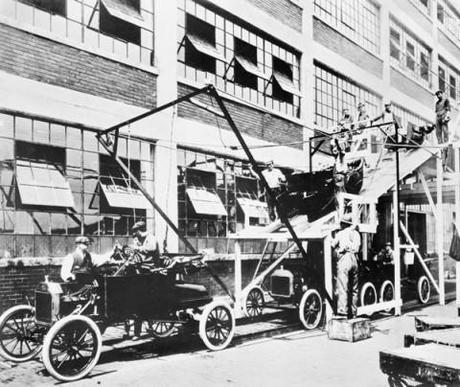
Economist Dani Rodrik argues that democracy as we know it is a product of industrialization.
Most rich countries followed the same historical path to economic development: a period of industrialization, followed by rising productivity and a shift away from manufacturing to a service economy. But economist Dani Rodrik argues that today’s developing countries seem to be de-industrializing at an earlier, and poorer, stage — a process which could threaten the development of democracy.
In the United States, employment in manufacturing peaked at about 27 percent of the workforce, followed by a transition to a service-oriented economy which today employs less than 10 percent of its workforce in industry. Other Western countries followed similar trajectories: Germany, for example, peaked at about 40 percent before steadily declining.
But, Rodrik points out, today’s emerging economies seem to be shifting away from manufacturing at a much earlier stage. Even industrial powerhouse China seems to have never employed more than about 15 percent of its population in manufacturing — and that share is already declining, even as China’s economy continues to grow.
The economic causes and consequences of this new pattern are still unclear. To Rodrik, it is worrying that countries now being to deindustrialize at lower levels of per capita GDP — $2,000 for India, $3,000 for China, and $5,000 for Brazil, as compared to $9-11,000 in Western countries that industrialized (and de-industrialized) earlier. But this could simply be an effect of new technologies and international trade patterns. A service-oriented Brazil or India could excel economically in the 2020s just as a manufacturing-oriented South Korea did in the 1980s.
The potentially bigger problem Rodrik outlines is what this shift may do to the development of democracy, which, in rich countries, has followed a similar path to the development of industry. Disciplined, party-based mass politics, organized around a right-left axis, are a feature of nearly all stable, mature democracies. In an industrialized society, labor-management conflicts on the factory floor lead to political solutions where parties — organized around ideas rather than religion, ethnicity, or personality — learn to hash out the best balance of regulation, taxes, and public services through the electoral process. (Rodrik doesn’t mention it in his article, but industrialization also leads to the development of large, formalized, often publicly-traded firms that also have a political stake in the orderly functioning of democracy.)
If Rodrik is right, and democratic development as we know it is an outgrowth of industrial -style capitalism, then the consequences of premature deindustrialization could extend far beyond the economic sphere. As he concludes:
The habits of compromise and moderation have grown out of a history of workplace struggles between labor and capital – struggles that played out largely on the manufacturing shop floor. Given premature deindustrialization, today’s developing countries will have to travel different, as yet unknown, and possibly bumpier paths to democracy and good governance.

